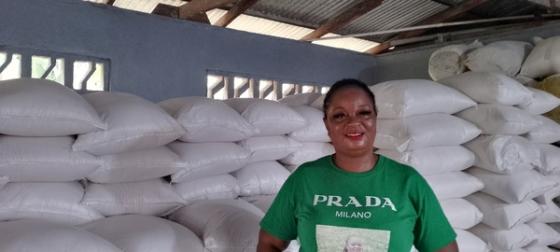Liberia: Cassava Processor Calls for Export Access

Local Cassava processor
— Supplies 600 25 kg bags processed cassava for WFP School Feeding Program
The Chief Executive Officer (CEO) of the Destiny Women Cassava Processing Center, Madam Comfort Jallah, has underscored the need for an expanded market for cassava products to improve cassava enterprise business for processors within the country.
She said that this can happen if the Liberian government ensures the improvement of the capacity of the National Standard Laboratory (NSL) to make exports possible for cassava and other food products.
She said export opportunities will greatly improve the income of both processors and farmers.
Jallah also said that the government needs to ensure the passage of the 10 percent cassava composite flour policy in order to develop or improve the cassava market.
The 10 percent cassava composite flour policy requires baked products using flour to incorporate at least 10 percent cassava flour into the wheat flour. Currently, up to 25 percent cassava content does not have a significant impact on the taste of bread.
Experts have said that the policy is attractive to bakers, as it could mean cost-savings due to the lower cost of cassava flour.
Additionally, according to experts, it could also mean a reduction in the importation bill as well as the creation of a market for huge quantities of metric tons of cassava tubers that could be produced annually by smallholder farmers.
According to Jallah, the improvement of the Standard Laboratory and the passage of the cassava policy will help reduce poverty in the lives of rural people who are engaged in agriculture, as that will ensure better market opportunities.
"Every time we take our products to the standard lab for testing, we are told that they are not ready. It's required that local foods get tested and businesses get certified to get export access. The government needs to also pass the 10 percent cassava composite flour policy to improve the market," she said.
Cassava is the second staple food for Liberians, but the production is still at a low scale. Stakeholders believe that cassava, if prioritized by the government, will help reduce the level of hunger facing the country and create more jobs for rural citizens.
Institutional buyers key
Though the Destiny Women CEO has complained about the limited market situation, she disclosed that the only market currently available for cassava processors is institutional buyers.
She told the Daily Observer in an exclusive interview over the weekend at her facility in Bentol City, Montserrado County, that her business is currently enjoying the market of the school feeding program initiated by the World Food Program.
She said that her processing center has obtained a contract with the WFP School Feeding Program to supply processed cassava products and other food items to schools.
“We are currently supplying 600 25kg bags of cassava for the school feeding program. We are very grateful for this opportunity. But we need a bigger market to sell our products,” she said.
The Destiny Women CEO claimed that her facility is impacting the lives of many residents within the community and its surroundings.
Meanwhile, Jallah stressed the need for the WFP school feeding program to support farmers in producing more beans within the country.
“We have an ideal soil for the production of beans, and so farmers need to be supported to produce more of the beans here,” she explained.
RETRAP’s Impact
She said, with assistance from the Rural Economic Transformation Project (RETRAP), a World Bank funded project at the Ministry of Agriculture, her center is now able to transport cassava tubers from the farm gate to the center.
According to her, RETRAP has provided a truck that the center uses to transport raw cassava tubers to the facility for processing.
She said that the initiative has reduced the profit loss for cassava farmers.
“The farmers no longer have to transport their produce here at the facility. This used to cost a lot of money to get cassava tubers here at the center. The logistical assistance has also helped us improve the incomes of our enterprise,” she said.
Jallah also said that the RETRAP project has assisted the processing center with a solar panel that has enabled the center to have a constant electricity supply.
“The solar panel is producing enough electricity for the facility, thus increasing the level of processing,” she mentioned.
